
The Basics - Getting Started May 1, 2001

The Basics - Getting Started May 1, 2001
Basic Capture Techniques for DV
Don't call it Digitizing!
If you are shooting DV, it's already digital. What you need to do is 'CAPTURE' the digital footage onto your HD.
As with everything FCP, there are at least a couple of methods to accomplish this. The methods seem to parallel certain personality types, so read the following, and pick the method that works best for you.
There is one rule that is not subject to discussion or personality type:
YOU MUST LABEL EACH REEL OF TAPE CLEARLY AND DISTINCTLY, AND YOU MUST ENTER THAT NAME INTO THE 'REEL...' FIELD IN THE LOG & CAPTURE WINDOW.
No ifs, ands, or buts. A cassette without a label might as well be blank, and if you are the stubborn personality type that must learn by experience, soon you will record over a very important tape because you didn't label it.
Luckily, FCP won't let us get by without entering a reel number, but it will let us get by with using the default 'Reel 001' for every tape. Please be vigilant and enter a unique reel number every time.
As of 3/01, appropriate for FCP 1.2+, any changes for v2.0 will be added at a later date.
By Gretta Wing Miller

A note on methods:
I prefer to use and teach a two-handed, keyboard in the left hand, mouse in the right approach to editing in FCP. If you are more comfortable using the mouse alone to begin with, here is a substitution chart:
| Keyboard | Mouse |
| Space Bar | Play button |
| Letter 'I' | Mark In |
| Letter 'O' | Mark Out |
| F2 | Log Clip |
| cmd-S | File > Save |
Preparing to Capture:
Put your first tape in deck/camera.
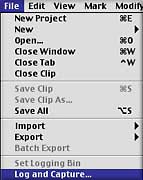
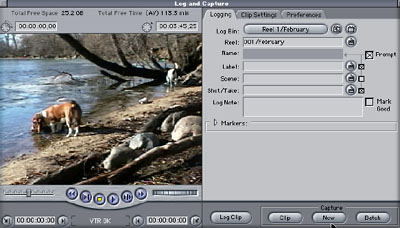
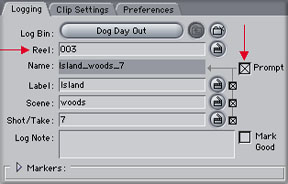
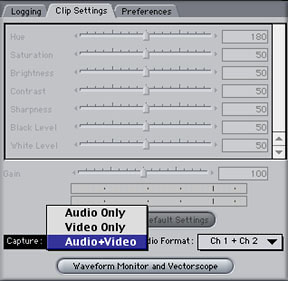
Click on the Clip Settings tab to define what you want to capture:
Audio and Video, just Video, or just Audio.
The default, 'Audio & Video, ch1 & ch 2' will be perfect for most situations.
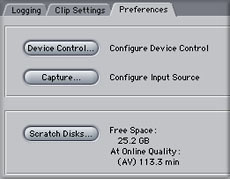
The buttons on the 'Preferences' tab are for verification of the settings you have made earlier
when you set your Preferences (See "FCP: An Ambitious Beginning"), or for making changes
to those settings without leaving Log & Capture.
Method 1: Classic Log & Capture
Best for Slated, Multiple-Take Narratives.

Spacebar to start the tape rolling, press 'I' at your chosen In point. I would mark the In point after the slate to conserve scratch disk acreage, using the slate as a reference for naming the clip. When you come to the end of the take, press F2 (Log Clip). Pressing F2 sets the Out point and opens the Log Clip dialog.
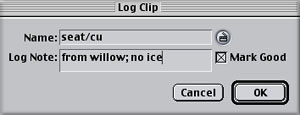
Name it correctly, write any comment in the Log Note box, and check the 'Mark Good' box for the takes you like best, then OK.
The tape should continue to roll, and after the next slate, mark the next In point; F2 at the end of the take, name this take, or allow FCP to increment the take number automatically if it is another take of the same scene.
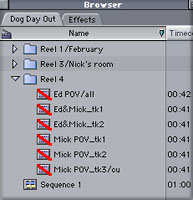
This method doesn't capture any clips to the HD; it creates a comprehensive LOG, in the Browser, of all the shots on your reels.
When you have finished Logging, you can select the takes with which you want to begin editing, and Batch Capture only those (see below). All the takes you have marked as good will have a check mark by them in the 'Good' column of the Browser for easy reference.

Batch Capture
With clips selected in the Browser, go to File>Batch Capture. Choose 'All Selected Clips', and OK.
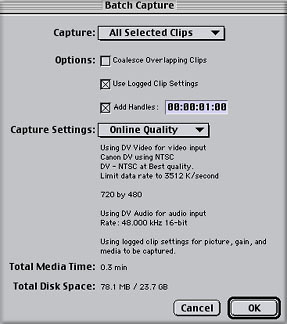
All the information about the clips you want to capture is presented in this Batch Capture dialog.
Handles
Specify extra seconds to be added to the head and tail of each clip as it is captured. This makes up for reaction time as you press your In and Out points. Your logging should be fairly loose anyway, with at least several extra seconds at head and tail.